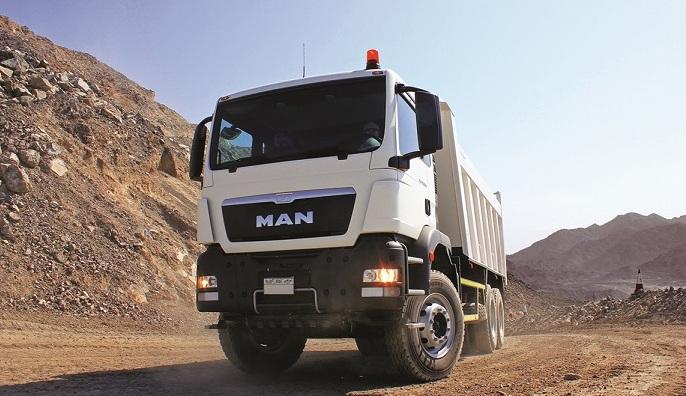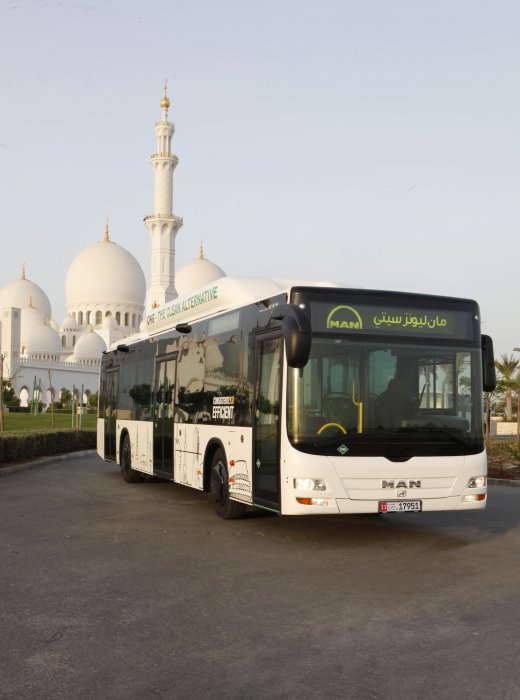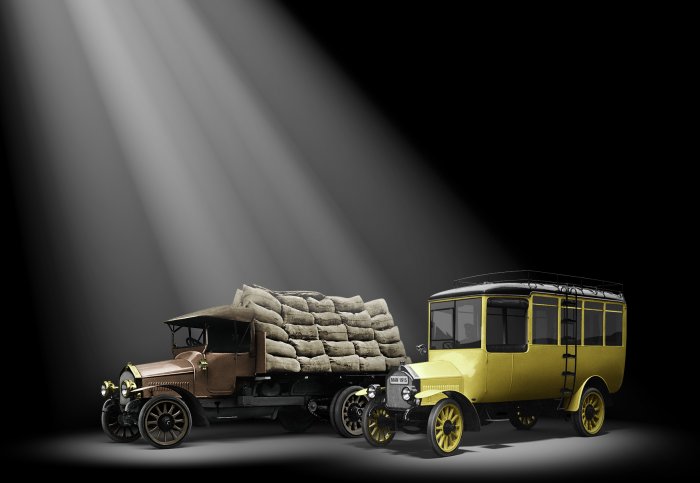
100 years of MAN Truck and Bus: Ready for the future
With success and experience: MAN has been building efficient and reliable commercial vehicles for the past century
MAN Truck & Bus today announced an important milestone with the company celebrating 100 years of commercial vehicle manufacturing. In the Middle East, MAN Truck & Bus has built a leadership presence with operations across the GCC and Levant over the years.
Franz von Redwitz, the new Managing Director of MAN Truck & Bus Middle East said, “Celebrating 100 years of commercial vehicle manufacturing is a significant achievement and I am proud to lead MAN Truck & Bus Middle East during this historic occasion. MAN has a longstanding presence in the region and along with our valued distributors we have earned a well-founded reputation as an innovative and reliable commercial vehicles manufacturer delivering high quality products to our customers in various industries. As we look ahead to the future, we rededicate ourselves to maintaining this wonderful heritage by continuing to support our customers’ transportation requirements with leading industry products and services.”
Here is an overview of the most important milestones.
On 21 June 1915, a new company was entered in the trade register of the City of Nuremberg: "Lastwagenwerke M.A.N.-Saurer". The company was established as a joint venture between Maschinenfabrik Augsburg-Nürnberg AG and Saurer, a Swiss producer of commercial vehicles. The first MAN-Saurer 3-tonne truck soon left the joint factory in Lindau at Lake Constance. It was followed by the first buses, which were used as long-distance buses by the Imperial Post Office and transported passengers as well as letters and parcels. This was the beginning of commercial vehicle manufacturing at MAN, a success story that has not only shaped the history of the company itself. MAN has significantly influenced the development of trucks and buses with its advanced and often revolutionary innovations for the last 100 years – and is still continuing to do so.
The early years
In 1916, production was shifted to the MAN plant in Nuremberg. The company traded as "M.A.N Lastwagenwerke" after the departure of Sauer in 1918. In 1924, MAN presented the first truck with a direct-injection diesel engine – which created the basis for the triumph of diesel engines in truck construction. It saved up to 75 percent of operating costs in comparison with the petrol engines common at the time. Economy and efficiency were already important development goals of MAN at that time and they still apply today. During the same year, MAN produced the first low-floor bus with a specially designed low-frame chassis. The buses that MAN had previously built since 1915 had run on truck chassis.
In 1928, MAN presented its first three-axle truck, which was the precursor of all subsequent MAN heavy-duty trucks. In 1932, the S1H6 truck was equipped with a D4086 diesel engine that delivered 140 hp and was then considered the most powerful diesel truck in the world. In 1937, the next technical milestone was achieved with the development of an extremely fuel-efficient direct-injection diesel engine and the introduction of the all-wheel drive.
MAN trucks as engines of reconstruction
Trucks were in demand during reconstruction work after the Second World War. In the 1950s, the MAN F8 with its 180 hp V8 engine became the flagship of the economic miracle in the new Federal Republic of Germany. MAN demonstrated its level of innovation as early as 1951, when it introduced the first German truck engine with exhaust gas turbo-charging. The six-cylinder engine achieved 175 hp with an 8.72-litre displacement, a remarkable power increase of 35 percent. In 1955, MAN moved its truck and bus production to its new site in Munich. The Nuremberg plant became the centre of competence for engine production.
MAN also proved its innovative powers in bus construction. In 1961, the company introduced the 750 HO to the market, the first bus in modular design. The standardised chassis was used with different superstructure versions for public buses, intercity buses and travel buses.
Büssing brought the lion to MAN
In 1971, MAN took over Büssing Automobilwerke and the company's plant in Salzgitter. MAN adopted Büssing's specialised underfloor engine technology as well as Büssing's logo, the lion of Brunswick, which has since decorated the radiator grille of all commercial vehicles made by MAN. At the end of the 1970s, MAN started to cooperate with VW in the light truck segment. The six- and eight-tonne trucks of the G-series were jointly produced until 1993. Today, MAN is part of the VW Group.
However MAN's show-pieces have always been trucks with hoods for construction work and heavy Cab-Over-Engine trucks for long-distance transport, such as the Type 19.280, which was the first MAN truck to receive the "Truck of the Year" award in 1978. Numerous awards followed, for example for the MAN F90, which was introduced in 1986 and received the "Truck of the Year" award the following year. The generous driver's cabin of the F90 was particularly impressive. Ergonomics and comfort for the driver have always been important concerns for MAN designers. The most successful truck model of the nineties was the F2000. The heavy series has had standard engines with electronic injection control since 1994.
MAN buses also have their highlights. In 1992, MAN introduced the Lion's Star, a travel bus that would determine the names of all subsequent MAN bus generations. The high-decker for long-distance-travel was particularly aerodynamic and therefore saved fuel.
MAN in the new millennium
MAN started the new millennium with new innovations. In 2000, the "Trucknology Generation Type A" called TGA set new standards regarding comfort and ergonomics as well as new technologies such as the MAN TipMatic or the MAN Comfort-Shift for optimal gear changes. MAN strengthened its position in the premium coach segment by taking over the NEOPLAN brand in 2001.
The introduction of the D20 engines with common rail injection in 2004 was a real milestone in engine technology. MAN was the first commercial vehicle manufacturer to change all its engines to this economic and environmentally friendly, electronically controlled injection method. MAN also modernised the light and medium series by introducing the TGL and the TGM in 2005. It was possible to achieve Euro 4, the exhaust gas standard at the time, by a combination of exhaust gas recycling and particle filters, entirely without additives such as AdBlue. Two years later, two models were presented to succeed the TGA in the heavy series: The TGX was designed for long-distance transport while the TGS was used for applications requiring traction and heavy distribution traffic. MAN received the "Truck of the Year" award for the seventh time and for both models - which is a record in this sector.
In 2010, MAN started serial production of a city bus with a hybrid drive, the Lion's City Hybrid. The Lion's City Hybrid saves up to 30 percent fuel due to its innovative hybrid drive. The model quickly became a huge success and received the ÖkoGlobe Award in 2011 and the Green Bus Award in 2012 for its sustainable concept.
Into the future with MAN
The development of resource-saving and environmentally friendly vehicles has always been one of the main goals of MAN Truck & Bus. Euro 6, the latest exhaust gas standard was a challenge that MAN met in 2012 with its latest generation of TG vehicles. They fulfil the strictest requirements with maximum fuel efficiency. In the autumn of 2014, MAN introduced the latest engine generation, the D38, which is currently the culmination of 100 years of engine development in commercial vehicles. The frugal Euro 6 diesel engines reach up to 640 hp, using a two-step turbo-charger.
The current drivers of product development are sustainability, the in-house climate goals of the company, general political conditions and the limited availability of fuel resources. MAN is therefore considering further development of various, alternative drive concepts. Hybrid drives in commercial vehicles will be part of the drive concept of the future in all areas of application. A diesel/electric hybrid is already being a standard drive for the city bus. MAN has introduced the TGX Hybrid at the IAA 2014 fair. This is a concept vehicle for a TCO-optimised truck hybrid drive that might be used in long-distance transport. MAN has built the Metropolis research vehicle, a fully electrically operated heavy truck with a range extender for tasks in the city. It is currently in the test phase.
Compressed natural gas (CNG) and biogas are already available as alternatives. Engines suitable for CNG can also be operated with biogas in an almost CO2-neutral manner. An example is the new Lion's City GL CNG natural gas articulated bus, which won the "Bus of the Year 2015" award. The established range of natural gas city buses will be supplemented by trucks with a CNG drive in 2016.
The Department for Futures Research analyses global mega-trends and determines the direction for the development of future vehicle generations. MAN's developers are already working on vehicles that no longer need a driver for certain activities, for example when a safety vehicle secures motorway building sites. MAN Truck & Bus will use these and completely new ideas to ensure sustainable development of ultra-modern business vehicles in the future.
-Ends-
MAN Truck & Bus in Middle East
Since 2006, MAN Truck & Bus Middle East has been the regional representative of MAN Truck & Bus AG which is headquartered in Munich, Germany and the largest company of MAN Group. It is a leading provider of commercial vehicles and buses that are renowned for their robustness, reliability and adherence to high standards of driver and passenger comfort and safety.
MAN Truck & Bus Middle East operates through an extensive network of private capital dealers and importers in 14 countries namely Afghanistan, Bahrain, Iran, Iraq, Jordan, Kuwait, Lebanon, Oman, Pakistan, Qatar, Saudi Arabia, Syria, United Arab Emirates and Yemen. The local coordination office is located in the UAE, Dubai Airport Free Zone and guarantees for efficient sales and after sales support in the Middle Eastern region.
Accommodating for the demanding operating conditions in the Middle East, MAN Truck & Bus Middle East provides full-fledged turn-key solutions for both goods and passenger transportation by road through its light (TGL) , medium (TGM) and heavy-duty (TGS WW) ranges of trucks, and MAN and NEOPLAN buses and coaches that provide basic to VIP luxury transport and travel requirements.
www.mantruckandbus.com/press
The MAN Group is one of Europe’s leading industrial players in transport-related engineering, with revenue of approximately €14.3 billion in 2014. As a supplier of trucks, buses, diesel engines, turbomachinery, and special gear units, MAN employs approximately 55,900 people worldwide. Its business areas hold leading positions in their respective markets.
Share:
ADD TO EYE OF Riyadh
MOST POPULAR
Sustainable security design gains momentum in the UAE’s urban landscape
Tuesday 7 January, 2025 9:35Wave of speakers confirmed for inaugural maritime event in Qatar
Wednesday 8 January, 2025 8:51ADDED launches Abu Dhabi Registration and Licensing Authority to develop and regulate business sector
Tuesday 7 January, 2025 10:30Sharjah Literature Festival's Inaugural Edition to Launch in January 2025, Organised by EPA and SBA
Tuesday 7 January, 2025 10:23 ×




























